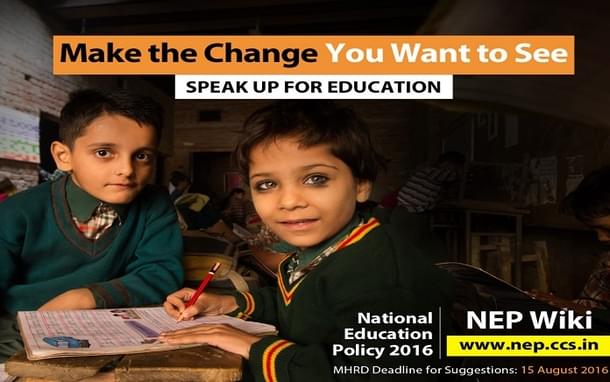Sponsored
Sponsored: NEP Wiki Democratises Discourse On New Education Policy
Parth J Shah
Aug 09, 2016, 12:05 PM | Updated 12:05 PM IST
Save & read from anywhere!
Bookmark stories for easy access on any device or the Swarajya app.


India has embarked on a historic mission of formulating a new National Education Policy (NEP), which was left untouched since 1992. The two official documents give a distinct idea of the contours of the NEP; one by the Committee for Evolution of the New Education Policy, headed by TSR Subramanian, and the second by the MHRD, titled ‘Some Inputs for Draft National Education Policy 2016.’ The MHRD has also invited comments on the document with a deadline of 15 August to be mailed at nep.edu@gov.in.
The National Education Policy Alliance, India’s diverse group of civil society organisations (CSOs), has started an avant-garde concept of creating a Wiki on the government’s draft National Education Policy (NEP) to democratise the policy discourse. The Wiki aims at providing an open platform to deliberate, publicly collaborate and find realistic solutions for the challenges plaguing the education sector and influence the policy in a participatory manner. It is a collaborative, productive and transparent platform for public discourse on education policy.
Wiki technology is an excellent tool to democratise the public discourse. NEP Wiki provides a transparent process, wherein one can read the comments of all the others, as opposed to each one sending in suggestions unknown to other citizens. It is a more collaborative approach since, before making a comment, one can see all the other points of views and, therefore, build on the contributions of all. It is more productive since, at the end of the process, there will be a new policy document and not just a list of random reform ideas.
The NEP Wiki is the need of the hour, as it involves a large community of stakeholders from all walks of life, be they teachers, students, parents, academicians and, above all, ordinary citizens passionate about quality education for all. The initiative is harnessing technology in the best possible manner by including pluralist views from people of diverse backgrounds. Many reform ideas have emerged from these conversations.
To begin with, our very own government needs to separate its role as the provider and the financier of education from its mandate as a regulator. This is similar to what we have done in many successful sectors like telecom, banking, insurance and aviation. There are inherent conflicts when the same department runs educational institutions and also regulates the sector. It lacks an independent and neutral monitoring of government and private schools; favourable treatment is given to government schools and lowers accountability in the financing of education. These three roles should be separated and ideally handled by three independent entities for an effective regulatory as well as education delivery system.
Government funding can take the route of financing a ‘student’ instead of a ‘school.’ Why should only government schools have a claim on public funds? School vouchers, direct cash transfers, scholarships, education credit accounts could all serve as instruments to effect per-student funding. This approach helps bring more accountability and transparency in government expenditure apart from facilitating healthy competition between different schools, with the net outcome being improved and efficient quality of education. This has been practised successfully in a lot of countries (Sweden, Brazil, Bangladesh, Italy, New Zealand) and has given tangible, successful results.
Another critical recommendation highlights learning outcomes-based school recognition. The current approach to school regulation is largely inputs-driven. The focus of recognition and regulation is on infrastructure, teacher qualifications and salaries, and compliance with various input-related government norms. Many of these norms have little connection with learning outcomes of students. India must introduce a system of regulation where learning outcomes become the key factor in regulation of schools, both government and private.
Gujarat is one example where school recognition is driven by learning outcomes. It should be replicated across the country. Third-party assessments should be put in place to identify school performance and student learning outcomes.
The recent ASER and National Achievement Survey studies indicate that half of class five students cannot read, write or solve simple mathematical problems of class two. If there is one goal that the government must have, it is that every student is able to read, write and do basic math by class three.
Everyone knows that teachers and principals are key to high quality education. Their selection and hiring should be made on the basis of demonstrated competencies and not just degrees and seniority. Linking teacher and principal performance with career advancement, increments and foreign training could prove to be quite effective. The principal should be a genuine leader of the school, and not just a senior teacher. All principals should receive specific leadership training. The training for teachers should be customised to their specific needs, as opposed to the current practice of mass training. They should have access to online training and courses, be required to renew their credentials at regular intervals and have a community of peers whom they can reply upon to help solve pedagogical challenges.
As you see at the NEP Wiki, there are many ideas and, of course, some counter ideas, all being debated openly. Join the national conversation on the new education policy!
(This article is an advertisement)
Parth Shah is the president of the Centre for Civil Society, which has been advocating freeing education from the licence-permit-quota regime and has implemented a school choice voucher programme.




